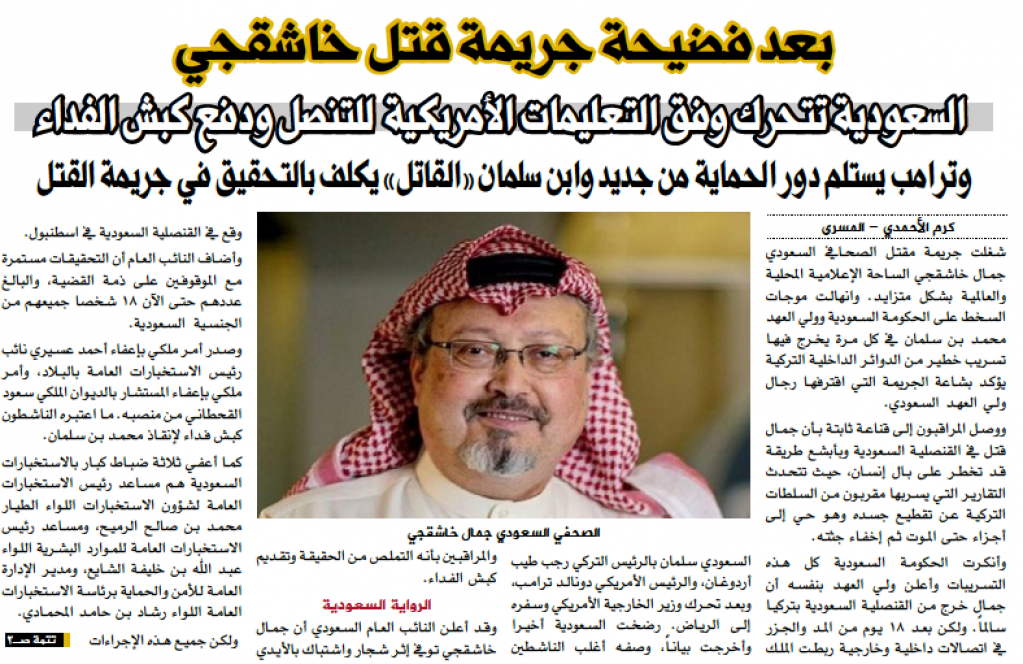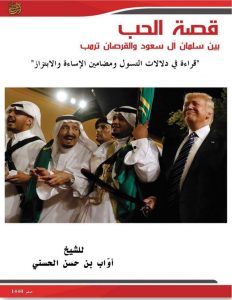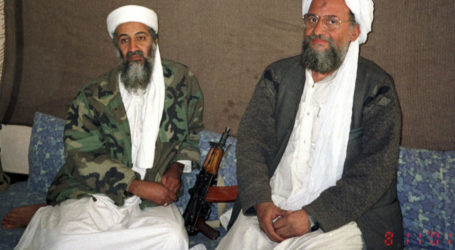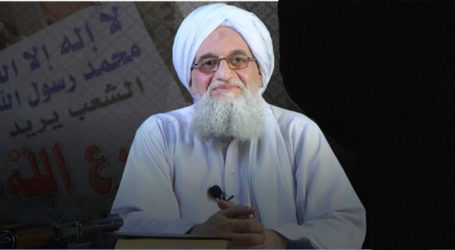AL Qaeda tries to capitalize on Saudi controversy
Al Qaeda’s media team continues to read the Western press. In recent weeks, the group has released two pieces focusing on the debate over America’s decades-long relationship with Saudi Arabia. Of course, al Qaeda has criticized the two nations’ friendly ties since the 1990s. But the new writings are intended to capitalize on recent controversies, including the murder of Jamal Khashoggi.
The first essay, titled “The Love Story Between Salman al Saud and the Pirate Trump,” was penned by a little-known al Qaeda figure known as Sheikh Awab Bin Hasan al Hasni. As Sahab, the main propaganda arm for al Qaeda’s senior leadership, disseminated the tract online in Arabic via Telegram and its new website. On Nov. 25, As Sahab released an English translation of Hasni’s piece as well.
Hasni begins his tract by comparing President Trump to a master and King Salman to his slave. But he quickly transitions to Crown Prince Mohammad Bin Salman (MBS), saying he is a “spoiled boy” who is “addicted” to video games.
Al Qaeda is eager to highlight such exchanges, as it portrays the Saudi rulers as subordinate to Trump.
Focus on the war in Afghanistan and America’s declining power
Hasni then pivots to America’s own supposed weakness, arguing that the US is losing its “economic and military domination.” From al Qaeda’s perspective, the wars unleashed by the Sept. 11 hijackings, and America’s response, have weakened the country.
“Let us not forget that some of the bigger factors that necessitated the retreat of the United States are the economic, political and social predicaments that befell her as a result of her long war with the Muslim Ummah and its jihadi vanguard in Afghanistan as well as other ‘armed Islamic transformative and awakening’ movements in Iraq, Yemen, Somalia, the Islamic Maghreb, Niger and other countries involved in the Islamic-American conflict,” Hasni writes. “America became involved in an unenvious quagmire of a conflict,” meaning Afghanistan.
Hasni asks: “Should it [America] keep its disgraceful forces in Afghanistan or stick its head in the sand and withdraw?” Either the US continues to suffer “a series of enormous human and financial losses,” or it faces a “disgraceful and shameful withdrawal crowned with defeatism.”
Citing Bob Woodward’s book, Obama’s Wars, Hasni argues that the American “elite” have struggled to deal with the 9/11 wars, suffering from “hesitancy, concern and confusion,” with “deep gaps and disagreement in managing this great predicament experienced by American institutions.” He cites or paraphrases comments from President Obama and his advisors — including National Security Advisor James Jones, Leon Panetta (who served as both Secretary of Defense and CIA Director) and Secretary of Defense Bob Gates — concerning the war in Afghanistan. All of them concluded that America would not defeat the Taliban, Hasni writes.
This is not mere propaganda. It is true that the US government determined years ago that the goal of the war effort would not be to defeat the Taliban, but instead to weaken it and, hopefully, negotiate a political settlement.
“Therefore, no one in ‘the White House’ and ‘the Pentagon’ is talking about eliminating the ‘Taliban and al Qaeda,’” Hasni writes. “Everyone has implicitly admitted that they have to deal with this reality.”
Hasni crows about America’s faltering war effort, saying the US and its Afghan allies have failed “to stop the advance of the Islamic Ummah’s vanguards represented by the Islamic Emirate [of Afghanistan] and the brigades pledging allegiance to it.” He writes that President Ashraf Ghani’s elected government is a “puppet,” which is how the Taliban describes the Afghan government. The Afghans and Ghani’s “American masters” cannot move their “military convoys” outside of Kabul’s “border without being punished by Taliban in an ‘al Qaeda’ style,” Hasni claims. (“Al Qaeda-style” attacks may be a reference to suicide bombings and similar tactics.)
“Additionally, the rest of the Afghan map, by Allah’s grace, is under the control of forces of the Islamic Emirate, may Allah glorify it.”
This is an exaggeration. However, it is true that the Taliban, which consistently refers to itself as the Islamic Emirate of Afghanistan, contests or controls half or more of the country.
Hasni essay includes additional references to topics that have been hot in the American press, including Woodward’s latest book, Fear: Trump in the White House. He mentions “neoconservatives” and the Mueller investigation, claiming that President Trump has been working for Russian intelligence. Even Omarosa Manigault Newman makes a cameo appearance. All of these references echo themes or arguments present in the America’s rancorous political debates.
But Hasni’s main theme is that the US is an economically and politically spent force as a result of the 9/11 wars. He argues that America is now going to retreat into “isolation,” just as it did after previous wars, such as Vietnam.
“Therefore the mujahidin have to strive and have to be diligent and patient because what they see of the symptoms of the large American retreat,” Hasni writes. The jihadists have been presented with a “strategic opportunity” now that America is supposedly retreating from the world.
“The mujahidin must boost their optimism for success,” Hasni writes. “They must know that the American wars are not everlasting and that the political setbacks, the diplomatic and the speedy American isolation that is occurring right now is the beginning of the inevitable American military withdrawal which is on its way.” The “symptoms of isolation and withdrawal,” which date to the “Obama era,” have “become clear and evident.”
Hasni blasts Saudi Arabia for paying America’s “protection fee,” saying that the US helps to shield the Saudis from not only Iran, but also the Sunni jihadists. He warns all of the “governments of bondswomen and slaves,” which have “flourished much under the Western political umbrella,” that their “American master will soon retract to care for his outside crises and internal conflicts.”
Return of AQAP’s Al Masra Newsletter
For the first time in more than a year, Al Qaeda in the Arabian Peninsula (AQAP) has released a new issue of its Al Masra Newsletter. The last issue of Al Masra was published online in July 2017. Since then, AQAP’s media team has suffered significant personnel losses, which disrupted the group’s ability to produce propaganda. [For more, see FDD’s Long War Journal reports, AQAP propaganda official reportedly killed in US drone strike and Analysis: AQAP remains under pressure.]
Al Masra’s editors specifically reference these losses, citing them as the reason for the lengthy interruption in the newsletter’s publication.
As FDD’s Long War Journal has repeatedly assessed, Al Masra is not just an AQAP publication, but also serves as a clearinghouse for information and perspectives on al Qaeda’s global network.

The lead story in Al Masra’s 58th issue deals with the murder of Jamal Khashoggi.
The newest issue attempts to capitalize on the controversy surrounding the Saudis’ murder of Jamal Khashoggi in Turkey. The account again mirrors public reporting, saying that various moves were made to scapegoat others for Crown Prince Mohammad Bin Salman’s alleged order.
Al Masra also contains a write-up of a recent lecture given by al Qaeda’s Hossam Abdul Raouf, a senior figure in the organization who is presumably based in South Asia. Raouf’s talk dealt with the fourth anniversary of the Pakistani military’s offensive in the northern tribal areas along the border with Afghanistan. A separate piece is also authored by Raouf.
*Note: It is not true that the Islamic State, or ISIS, has “disappeared” in Iraq and Syria, as MBS claimed. Instead, Abu Bakr al-Baghdadi’s men continue to operate a prolific insurgency in both countries.




